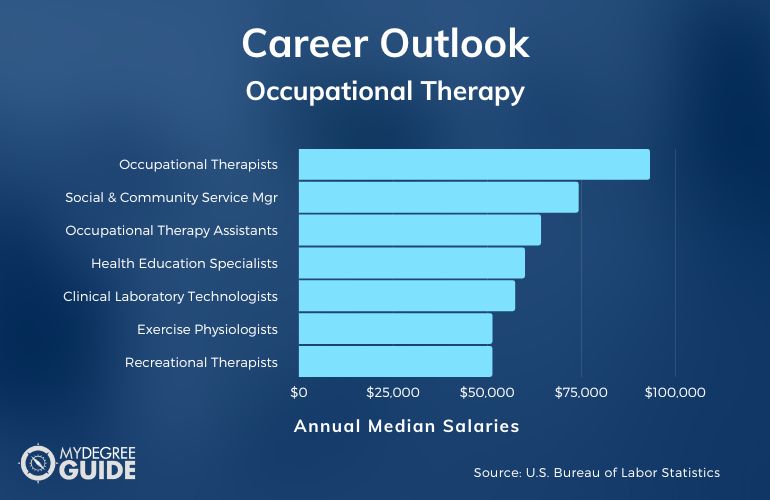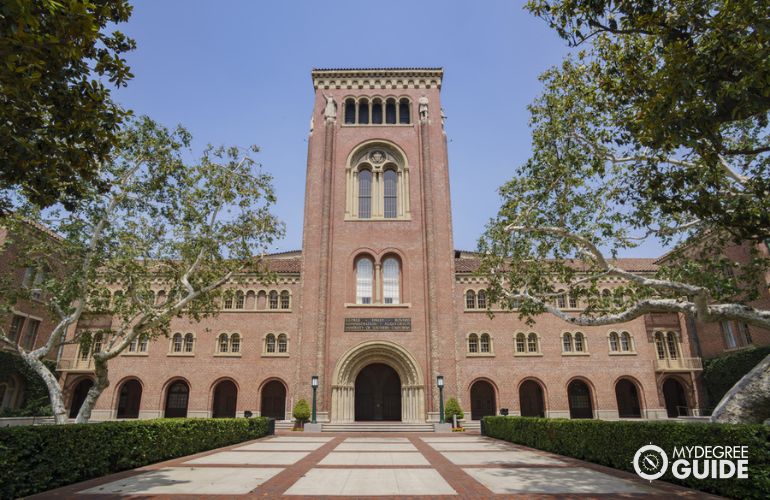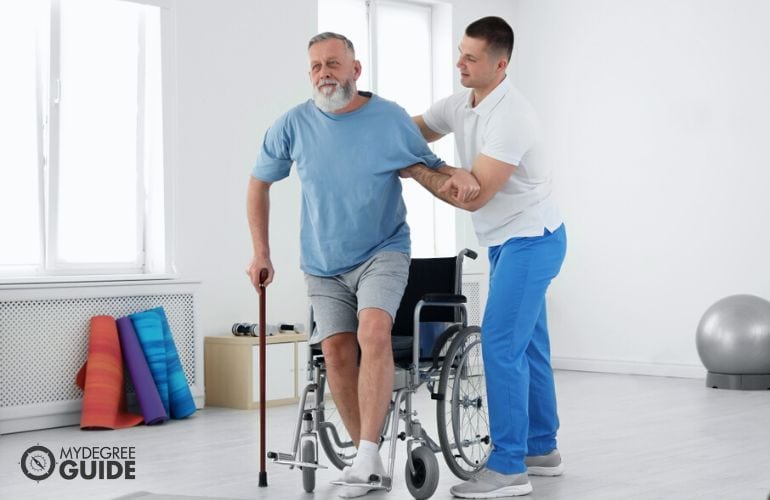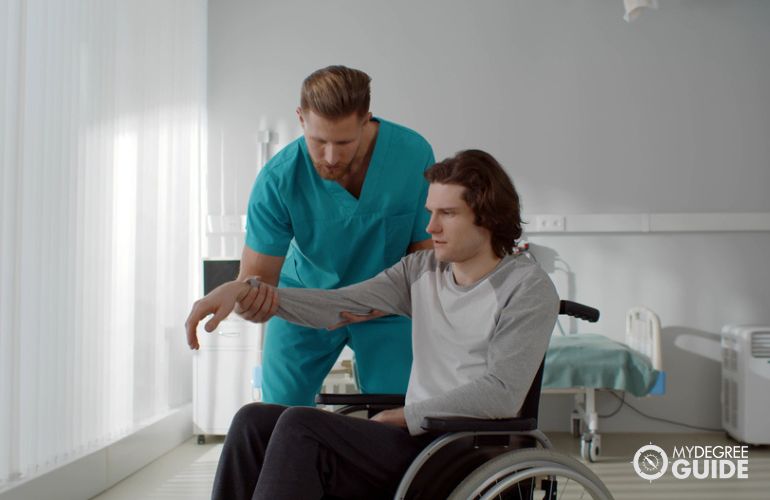If you have your sights set on becoming an occupational therapist, then you may be looking for information on the best occupational therapy major.

Your undergraduate studies can help set you up for success in a graduate-level occupational therapy program. Fortunately, there are a wide variety of occupational therapist bachelor degree options to pick from. Whether you pick a science-focused major, decide to study how the human body moves, or pursue a healthcare degree, you can develop a strong foundation for your future occupational therapy endeavors.
Editorial Listing ShortCode:
To practice as an occupational therapist, you will usually have to earn an advanced degree, such as an on-campus or online occupational therapy doctorate degree.
Universities Offering Online Bachelors in Pre Occupational Therapy Degree Programs
Methodology: The following school list is in alphabetical order. To be included, a college or university must be regionally accredited and offer degree programs online or in a hybrid format.
Brenau University
Brenau University offers an online program for a Bachelor of Science in Psychology with a concentration in Pre-Occupational Therapy. New admissions are usually offered every fall term. The program aims to provide hands-on experience by working in the field on an internship completed during the senior year. The program is designed to be completed in 8 semesters.
Brenau University is accredited by the Southern Association of Colleges and Schools Commission on Colleges.
Bridgewater State University
Bridgewater State University offers an online program for a BS in Health Sciences with a concentration in Pre-Occupational Therapy. The program offers an opportunity to complete an internship for course credit and to potentially gain practical experience in the field. Class sizes are typically capped at 30, which often results in a higher ability to get to know instructors and classmates.
Bridgewater State University is accredited by the New England Commission of Higher Education.
Carlow University
Carlow University offers a fast-track hybrid program for a Bachelor of Science in Health Sciences with a concentration in Pre-Occupational Therapy. The program is available on campus in Oakland, with some classes also offered online. The program can usually be completed in 3 years, and new terms commonly begin in the fall, spring, and summer.
Carlow University is accredited by the Middle States Commission on Higher Education.
Clarkson College
Clarkson College offers a hybrid program for a Bachelor of Science in Community Health with a Pre-Health Professional Track. During the final 2 semesters, participation in a 90 fieldwork component takes place in order to gain hands-on experience. Applications are typically accepted year-round, and the program is usually completed in 8 to 10 semesters.
Clarkson College is accredited by the Higher Learning Commission.
Florida Atlantic University
Florida Atlantic University offers a hybrid program for a Bachelor of Science in Exercise Science and Health Promotion with a concentration in Pre-Physical Therapy and Occupational Therapy. Courses are typically offered as a mix of online and in-person attendance.
The program aims to help prepare for entry into PT and OT professional schools upon graduation. The program commonly includes an internship with the goal of learning in the field.
FAU is accredited by the Southern Association of Colleges and Schools Commission on Colleges.
Kettering College
Kettering College offers a Bachelor of Science in Health Science with a concentration in Pre OT. The program’s courses are a blend of online and on-campus coursework. During the senior year, the program offers the opportunity to participate in an internship at a healthcare organization. The program may be completed in 3 years of full-time study.
Kettering College is accredited by the Higher Learning Commission.
Sacred Heart University
Sacred Heart University offers an accelerated hybrid program for a bachelor’s to master’s degree program in occupational therapy. The program follows a 3 plus 2 model, in which the first 3 years are dedicated to earning a bachelor’s degree in health science, sociology, exercise science, or psychology. This is followed by 2 years earning an MS in Occupational Therapy.
Sacred Heart University is accredited by the New England Commission of Higher Education.
University of Cincinnati
The University of Cincinnati offers a fully online program for a BS in Health Sciences with a concentration in Pre-Occupational Therapy. The program is intended for currently licensed occupational therapy assistants. Courses typically begin in the fall, spring, or summer, and enrollment may be part-time or full-time. The program is usually completed in 2 to 4 years.
UC is accredited by the Higher Learning Commission.
University of Michigan – Flint
The University of Michigan–Flint offers a BS in Health Sciences with a Pre-Occupational Therapy track. The program is available both face-to-face and online. A pre-occupational therapy club can help in meeting other students who share similar interests. A goal of the program is to help prepare for application to UM–Flint’s Doctor of Occupational Therapy program.
The University of Michigan – Flint is accredited by the Higher Learning Commission.
University of North Dakota
The University of North Dakota offers a partially online program to complete pre-OT coursework while earning a bachelor’s degree. Some courses are available online. Potential degree options are a BA or a BS in Psychology, a Bachelor of General Studies with a Health Studies emphasis, a Bachelor of Science in Kinesiology, and more.
The University of North Dakota is accredited by the Higher Learning Commission.
Online Occupational Therapy Majors

Professionals in the field of occupational therapy help patients engage in everyday activities, develop independence, and control how their bodies function and move. Becoming an occupational therapist requires a graduate degree. In preparation, there are various undergraduate majors suitable for aspiring occupational therapists.
Select the program that most interests you to jump to that section of the guide:
- Online Bachelor’s in Biology
- Online Bachelor’s in Biomedical Science
- Online Bachelor’s in Chemistry
- Online Bachelor’s in Kinesiology
- Online Bachelor’s in Occupational Science
- Online Bachelor’s in Psychology
- Online Bachelor’s in Public Health Education
- Online Bachelor’s in Sociology
You can explore these programs to see which ones best match your interests and goals.
Biology

To go into your graduate OT program with a strong science foundation, you might consider majoring in biology. It is the branch of science that studies living organisms, including humans.
Biology students study molecules, cells, and organisms. They explore various subfields within biology, including ecology, evolution, botany, zoology, and genetics. In addition to taking a wide range of biology courses, students in this program also study the other branches of science, such as chemistry and physics.
Editorial Listing ShortCode:
It is common for biology majors to have advanced training in mind. Occupational therapy is one option, of course. Others include pharmaceutical or physical therapy programs. Some students choose to go to medical, veterinary, dental, or chiropractic school.
With a biology degree, you could also start a career in laboratory research. There are job options for those with undergrad degrees only and more advanced opportunities for people with graduate degrees in science.
Biomedical Science

While a biology degree could provide a broad overview of that scientific discipline, biomedical science would equip you with a more focused set of knowledge. Biomedical science programs combine biology studies and healthcare studies, so you’ll take science courses focused on preparing for a healthcare career.
Many of the classes you take will overlap with those in a biology program. Examples include courses in cell biology and organic chemistry. You’ll spend more time studying human anatomy and physiology than most biology majors, though. In addition, the curriculum might include sociology and psychology classes.
Editorial Listing ShortCode:
Like a biology degree, biomedical studies provide solid preparation for advanced degrees in scientific research, healthcare, and medicine. Some colleges even offer the option to include a pre-med concentration track in the program. Of course, biomedical science’s focus on the human body would also serve to get you ready for occupational therapy studies.
Chemistry

While biology is a popular branch of science for pre-occupational therapy students, chemistry is another scientific field to consider.
In a chemistry program, you’ll learn about substances and how they interact with one another and undergo changes. In addition to taking general chemistry courses, you’ll also study organic, analytic, and physical chemistry. You will get to know the elements and their properties as you engage in many lab courses.
Editorial Listing ShortCode:
If you decide to major in chemistry, you might want to select a college that offers a healthcare track. That way, your studies will be likely to focus on the chemistry of the human body. You’ll learn about the processes that go on inside the body to sustain life and facilitate proper functioning. Biochemistry classes might be included.
Pre-med chemistry majors may advance to occupational therapy, medical, or dental school. Chemistry students can also pursue jobs in healthcare or research laboratories.
Kinesiology

Also known as exercise science, kinesiology is the study of human body movement. Considering that occupational therapists help patients improve how they move and complete daily tasks, a kinesiology major could be fitting. Students in kinesiology programs often take classes in physical fitness, human anatomy, and exercise physiology.
You’ll learn about physical development across the lifespan and study what happens in the body during exercise. There may be a course to introduce you to medical terminology, too. Some colleges combine kinesiology with health science. In that case, there may be several classes related to overall nutrition and wellness.
Editorial Listing ShortCode:
While occupational therapy is one possible graduate program for kinesiology majors to pursue, physical therapy is another popular option. Majoring in kinesiology could also lead to a career as a personal trainer, a fitness educator, or an athletic coach.
Occupational Science

Most colleges don’t offer a specific major for pre-occupational therapy but instead offer related programs to prepare students for OT school. Colleges that do have an OT-specific undergrad program may call it a Bachelor of Science in Occupational Science.
In general, occupational science is the social science that deals with how people spend their time and engage in activities. A major in this field may include courses in anatomy, physiology, and neuroscience. Other classes may cover psychology, sociology, and human development.
Editorial Listing ShortCode:
This undergraduate major might be just one component of a combined bachelor’s and masters program. Students who successfully complete the undergrad portion can move into the graduate portion. Through a dual program, it’s often possible to earn these two degrees in less time than it would take to do them separately.
With the specialized nature of a dual-degree path, working as an occupational therapist is the most common career for graduates.
Psychology

Physical therapists address patients’ specific physical injuries or limitations, but occupational therapy looks more broadly at the whole person. The goal is to improve not just physical movement but also overall functioning. Because of the whole-person nature of this field, studying psychology makes sense for many aspiring occupational therapists.
As a psychology major, you would study how the brain works and how brain processes influence behavior. Your curriculum would also address human development and learning. Many of the courses in this program cover the various branches of psychology, such as abnormal, cognitive, and social psychology.
Editorial Listing ShortCode:
Occupational therapy is just one of the post-graduation school and career paths to consider with a psychology degree. Many people decide to get a master’s or a doctorate in counseling or a related field so that they can become mental health therapists. A psychology major could also lead to a career in research, marketing, or social services.
Public Health Education

The field of public health education is about helping communities be healthy and whole. So much of your success in occupational therapy will depend on your ability to communicate with patients, and this major will help you develop that skill.
When you study health education, you’ll learn about factors that contribute to making people and communities well. They include strong families, good nutrition, and access to healthcare. Your classes will also teach you to assess community needs, plan intervention strategies, and educate people about good health choices. You can learn to provide leadership for community programs, too.
Editorial Listing ShortCode:
Going to occupational therapy school is just one of the many options you’ll have after graduation. You could also think about becoming a community health worker, a health educator, an outreach director, or a social services coordinator. Common work settings include public health departments, hospitals, community agencies, and youth service programs.
Sociology

As an occupational therapist, your work would address the ways that people fill their time and operate in their daily lives. Those topics tie into the field of sociology, which studies how people and societies function. By growing your understanding of sociological principles, you may better understand how to reach the patients in your care.
If you want to earn a degree in sociology, you’ll spend much of your time in college studying social problems, such as crime, economic inequality, racism, and the environment. You will also learn about sociological theories, human interactions, and societal change. The program will teach you to conduct sociological research as well.
Editorial Listing ShortCode:
Sociology majors pursue many different careers, some of which require graduate studies. Occupational therapy is one example, and working as a sociologist is another. If you decide you’d like to go straight into the workforce after graduation, you could think about a career in social services, human resources, or corrections.
Occupational Therapy Careers & Salaries

You may have the goal of learning how to become an occupational therapist. OT professionals often work in hospitals, therapy offices, schools, nursing homes, and home health agencies.
Occupational therapy aides and assistants work closely with occupational therapists, but they complete different training. Aides often learn on the job. Assistants go through two year associate degree programs and gain supervised work experience. If you opt to pursue a career outside of occupational therapy, your undergrad studies may influence which related jobs are most suitable for you.
According to the Bureau of Labor Statistics, the median annual salary for healthcare practitioners and technical healthcare workers is $77,750.
| Careers | Annual Median Salaries |
| Occupational Therapists | $93,180 |
| Social and Community Service Managers | $74,240 |
| Occupational Therapy Assistants | $64,250 |
| Health Education Specialists | $59,990 |
| Clinical Laboratory Technologists and Technicians | $57,380 |
| Exercise Physiologists | $51,350 |
| Recreational Therapists | $51,330 |
| Community Health Workers | $46,190 |
| Exercise Trainers and Group Fitness Instructors | $45,380 |
| Occupational Therapy Aides | $37,060 |
While becoming an occupational therapist is a popular job option, your schooling could also prepare you for a different career.
If health and mobility are important to you, you could work in the world of fitness and exercise. Ideas include teaching fitness classes, offering recreational therapy, or providing exercise physiology services.
To provide community wellness services, you might consider a career as a health educator or a community health worker. You might also serve in a nonprofit organization. For a science-based career, you could seek work in a research or medical lab.
Occupational Therapy Bachelor’s Curriculum & Courses

The following list describes classes you might take if you’re in an undergraduate program that closely relates to occupational therapy:
- Health Policy: In a policy-focused class, you might explore healthcare laws, public health initiatives, and the process of policy development.
- Health Promotion: There could be a class that prepares you to deliver healthy-living messages to patients and help them make positive choices.
- Healthcare Statistics: You might take a course that focuses on using and understanding data and statistics within healthcare contexts.
- Human Anatomy and Physiology: To gain a thorough understanding of the structure and function of the parts of the body, you may have multiple anatomy and physiology courses.
- Human Development: You’ll learn how people change and grow throughout childhood and adulthood.
- Introduction to Occupational Therapy: In this foundational class, you might explore the concept of occupation, study the ideas that undergird occupational therapy practices, and check out career paths in the OT field.
- Kinesiology: As you study the science of movement, you’ll learn how bones, muscles, and connective tissues work together.
- Medical Terms: You’ll prepare to work in healthcare facilities as you learn medical and scientific words and acronyms.
- Occupational Therapy Assessment: During your college program, you might learn to assess people’s strength and range of motion.
- Psychology of Occupation: There could be a course that makes connections between people’s ability to engage in daily activities and their thoughts and feelings of self-worth.
Your curriculum may vary considerably based on the specific undergraduate occupational therapist major you choose.
Admissions Requirements

Before admitting you to college studies and a pre-OT program, schools want to know that you’re prepared for university-level learning. Your application materials may help establish you as a promising candidate. Common admissions requirements include:
- High school transcripts
- Personal essay or a graded writing sample
- Recommendation letters
- SAT or ACT scores (not required at all colleges)
Some occupational therapy schools prefer for students going into health-related fields to have taken lab-based biology and chemistry courses in high school.
Accreditation

To increase your chances of getting into occupational therapy graduate school, it’s beneficial to attend a regionally accredited school.
To become accredited, colleges go through a careful evaluation process by an outside organization. Holding accreditation status signifies that a school provides a solid education. To get into an accredited graduate program, it’s usually necessary to hold a regionally accredited bachelor’s degree.
Other benefits of regional accreditation include the ability to use federal financial aid and a greater likelihood of credit transfer between institutions. Accredited degrees can also increase your chance of qualifying for jobs.
Financial Aid and Scholarships

State and federal aid may help you pay for a college program. Your eligibility will depend on your financial need. The package you receive might include loans, grants, or both.
Filling out the Free Application for Federal Student Aid (FAFSA) is the first step toward federal assistance, and many states use the FAFSA in their aid calculations as well. Employers are another source of financial support for some students. Particularly if you plan to keep working during school, you may receive a tuition reimbursement benefit from your workplace.
There are scholarships that can help with tuition costs as well. It’s common for colleges to give out scholarships directly, particularly to students who have grades or skills that set them apart. You can also see if you qualify for scholarships from organizations you belong to or from national programs as well.
What Degree Do You Need to Be an Occupational Therapist?

To work as an occupational therapist, it’s necessary to have at least a master’s degree in the field. A doctorate is sometimes preferred. You’ll first complete your bachelor’s degree. There are many potential majors for occupational therapy hopefuls.
Most OT programs don’t require a certain field of study. Despite that, there may be some undergrad prerequisites that need to completed before graduate studies. If you select a major that closely aligns with occupational therapy, you’re more likely to complete those prerequisite classes during your bachelors studies. Examples of promising majors include biomedical science and kinesiology.
What Is a Pre-Occupational Therapy Program?

A pre-occupational therapy program is a college undergraduate program that lays the foundation for OT graduate programs.
Most colleges don’t offer a specific pre-OT degree. Rather, they offer one or more majors that are relevant to the field. They usually suggest programs that will meet the prerequisite requirements for OT masters or doctoral degrees.
Some colleges do offer specific occupational therapist degrees for undergraduate students. Such schools usually have advanced OT programs that graduates can eventually transition into.
What Can You Do with a Pre Occupational Therapy Degree?

Many people who complete a pre-OT degree continue with their education by enrolling in a graduate program for occupational therapy. After finishing that degree, they go on to pursue licensure as occupational therapists.
According to the Bureau of Labor Statistics, most occupational therapists earn between $63,320 and $123,870 annually. Since most pre-occupational therapy degrees aren’t specific to this one field, you may pivot toward a different career path instead. Potential options include being a personal trainer, a health education specialist, or a recreational therapist.
How Long Does It Take to Get an Occupational Therapy Bachelor’s Degree Online?

You can generally earn a bachelors degree in 4 years or less with full-time enrollment. Online programs that are designed to be completed quickly may take around 3 years. If you enroll in an online school, you might have the opportunity to take year-round classes. Also, each course might be about 8 weeks long.
Enrolling in a combined bachelors and graduate program is another way to complete your occupational therapy training quickly. It will take longer than doing a bachelors program alone, but it will typically be shorter than two separate degree programs.
What’s the Difference Between Physical Therapy vs. Occupational Therapy Degrees?
Whether you study physical therapy or occupational therapy, you could play a role in patients’ rehabilitation teams.
| Physical Therapy Degree | Occupational Therapy Degree |
|
|
A degree in health sciences or kinesiology could work well for both pre-PT and pre-OT.
Is a Bachelor Degree in Occupational Therapy Worth It?

Yes, a bachelor degree in occupational therapy is worth it for many students. Occupational therapy is a growing field. The Bureau of Labor Statistics predicts jobs for occupational therapists will increase by 14% over the next ten years.
The population is growing older, and occupational therapists and OT assistants can support people who are aging. Becoming an occupational therapist requires an advanced degree, and a pre-OT bachelors can help you qualify for graduate studies.
Getting Your Bachelor’s Degree in Occupational Therapy Online

An occupational therapy career begins with preparation at the bachelor’s degree level. You can study healthcare, science, kinesiology, or social science during your undergraduate program.
You’ll take an assortment of classes that will lay the foundation for advanced OT schooling. Gaining the required schooling for becoming an occupational therapist can take time and commitment. Fortunately, that doesn’t necessarily require uprooting your life for years on end.
Rather, you can look at online schools that offer flexible degrees for occupational therapists. Now is the time to see which accredited online programs would best fit your OT goals.
